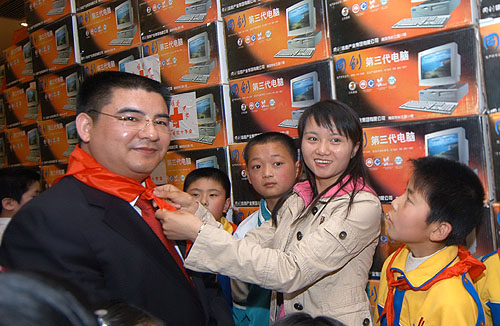|
 |
|
TOP PHILANTHROPIST: Chen Guangbiao (left), a successful businessman, vows to donate 70 percent of his annual profit for the good of the public. On April 28, 2006, he donated cash, computers and school uniforms worth 13 million yuan ($1.91 million) to the Jiangsu Red Cross Society. The picture shows him at the donation ceremony (XINHUA) |
The signs of business acumen had already appeared in Chen Guangbiao as early as 1978, when he was just a 10-year-old being raised in a poor farming family.
Using the short noon recess from school, Chen would carry two wooden barrels of water from his small, impoverished village in east China's Jiangsu Province to a town 2 km away. He peddled "1 fen (0.01 yuan) for all you can drink." His business brought in a relatively large profit for the little boy. He could earn 0.3 yuan ($0.04) a day, equal to almost half of the daily wages for an adult at that time.
"I know we are poor, but I still want to go to school," Chen told his mother. "If I can earn my own tuition, please allow me to continue the education."
His water delivery business made him the richest child in the whole village. His success allowed him to help pay tuition even for other children.
His initial success illuminated a way to change his fate. When he was 13 he biked more than 10 km every day to sell frozen treats to customers. That led to his launching of a foodstuff business. By the age of 17, he had earned 20,000 yuan ($2,941), making him the youngest rich man in his town.
Though he found success in business, he still wanted to attend university. In 1985, he enrolled in the Nanjing University of Traditional Chinese Medicine. After graduating, he stayed in Nanjing, capital of Jiangsu Province, and set out to start his next business.
In 2003, an old stadium in Nanjing was to be demolished and he was invited to get involved. The job needed to be finished in one month and he would be paid no money. So he had the idea that he could sell the used iron which might make a profit. He decided to give it a try. Finally he sold the used iron alone for 4 million yuan ($588,200) and earned 1.85 million yuan ($272,000).
Chen found a viable and profitable way to recycle the waste. So he next decided to focus his efforts on the industry and established a recycling company called Jiangsu Huangpu Renewable Resources Co. Ltd. Beside the iron that could be sold to iron and steel companies, the cement block could be recycled into concrete after it was mixed with water, cement and sand, he said. And with different additives, all the construction waste could be made into at least seven types of building material, such as landfill, red brick and building blocks.
The recycled concrete has the same strength as new concrete, while its price is 15 percent lower than new, said Chen Zhongfan, a professor of civil engineering at Nanjing-based Southeast University. China produces 2 billion tons of construction waste, creating a rich market for recycling, he said.
Chen's company has changed China's demolition industry. Just a few years ago, the construction owner was forced to pay around 10 yuan ($1.47) per square meter to tear down a structure, but now the demolition companies spare no effort in winning projects on which they charge no fee.
Over the years, he has found that almost all the waste can be turned into profit, including old tires, disposable infusion bags and plastic needle tubes that can be made into synthetic-rubber tracks and tires for agricultural use. Household appliances and machinery can also be disassembled and recycled.
With a total staff of more than 4,000 and annual sales of 13.3 billion yuan ($1.95 billion), Chen's recycling business has expanded to Beijing, Shanghai, Tianjin, Hong Kong, Shandong, Hebei and Sichuan provinces.
Chen has not forgotten the difficult times he and his family suffered in his childhood. "When my family was unable to pay for my textbooks, my neighbors gave my parents money to pay for me. I will never forget that," he said. Over the last eight years, he has donated 800 million yuan ($117.6 million) to public welfare and was named China's Most Generous Person by topping the list of China's Top 10 Philanthropists in 2008 by Ministry of Civil Affairs.
Two hours after the May 12, 2008, Sichuan Earthquake, Chen brought a rescue team composed of more than 100 colleagues, 60 excavators and hoists to the affected area. They found more than 100 survivors.
"It is a must for me to repay the society," he said. | 
